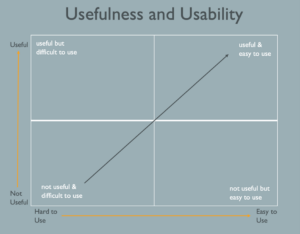In the fast-paced and ever-evolving landscape of business and technology, successful companies share a common trait — the ability to harness user insights to guide their development. This approach, known as Human-Centered Design (HCD), provides a framework that enables organizations to engage with their users, from initial generative research to summative evaluative studies.
The principles of HCD have many applications and the potential to produce highly successful products. In our first article, we introduced tips to help teams focus on the people as part of understanding the user. In this article, we examine the impact of research in identifying users’ needs, helping teams focus on the right problem to solve. Let’s delve into this key principle of HCD and see how research played a pivotal role in shaping one of today’s disruptive giants in the travel industry – Airbnb.
From Spare Spaces to Global Getaways
Airbnb, known for revolutionizing travel and lodging, didn’t start with the ambition to become a disruptive behemoth. Its founders initially envisioned a platform to connect conference attendees with homeowners offering spare space, particularly inflatable mattresses, during large conferences in San Francisco.
This initial concept was born out of basic market research, identifying a gap between demand and supply during major events. However, the turning point came when Airbnb engaged with its users and actively listened to their needs, goals, and motivations.
User Insights that Transformed the Business Landscape
As Airbnb interacted with its user base, the company learned valuable lessons about its users’ needs and aspirations. The founders discovered that by adapting to user feedback, they could not only meet existing needs but also uncover new ways their platform could be even more useful.
This user-centric approach transformed Airbnb from a niche solution for conference attendees to a global platform that redefined travel planning and lodging. The company’s evolution showcases the power of user research in understanding customer needs, adapting to their preferences, and ultimately guiding the development of a successful business.
Benefits of Market Research vs. User Research
While market research may identify existing needs, user research goes beyond, uncovering potentially new markets and insights that traditional methods might miss. Airbnb’s journey demonstrates that insights gained from user research can lead to the identification of untapped markets, paving the way for innovation and business growth.
Uncovering Usefulness and Usability to Impact Product Success
A key part of incorporating research is understanding the terms usefulness and usability in product development. Usability refers to how easy a product is to use. While usefulness is the combination of the product’s usability and the extent that it fulfills the users’ needs.
Products with low usefulness and usability tend to be dismissed by users. However, a product that is highly useful, even if challenging to use, can still find success. Don Norman, renowned expert in design, uses a pencil to illustrate that people tolerate the learning curve if the product’s usefulness outweighs its usability challenges. The difficulty of learning how to use a pencil is outweighed by the usefulness of learning how to write.
HCD aims to position products in the top-right quadrant of the usefulness and usability graph by continually incorporating user research in the process. The goal is to create products that not only meet users’ needs but also align with their preferred ways of interaction – much in the way of Airbnb’s continuously evolving platform.

User Experience as a Shared Responsibility for Shared Success
Contrary to common misconceptions, Human-Centered Design is not exclusive to designers. Every member of a product team, regardless of their role, can contribute to the application of HCD principles. The key lies in understanding the right problems.
Take one of the founders of Airbnb for example. Nathan Blecharczyk, Co-founder and Chief Strategy Officer at Airbnb was a computer science major who was brought on by his fellow Co-founders as the company’s first engineer. Together, the three Co-founders created a thriving global rental empire.
User experience is not a designated role for any specific team member; rather, it is the collective outcome of decisions made by the entire product team. When these decisions are guided by user insights, the resulting product is more likely to be both useful and usable.
The Bottom Line
In the dynamic landscape of business and technology, companies that actively engage with their users and apply Human-Centered Design principles are better positioned for success. Airbnb’s journey serves as a compelling case study, highlighting the transformative power of user research in shaping a business from its nascent stages to a global phenomenon. As we navigate the future of innovation, embracing user-centric approaches becomes not just a best practice but a strategic imperative for sustained success.
